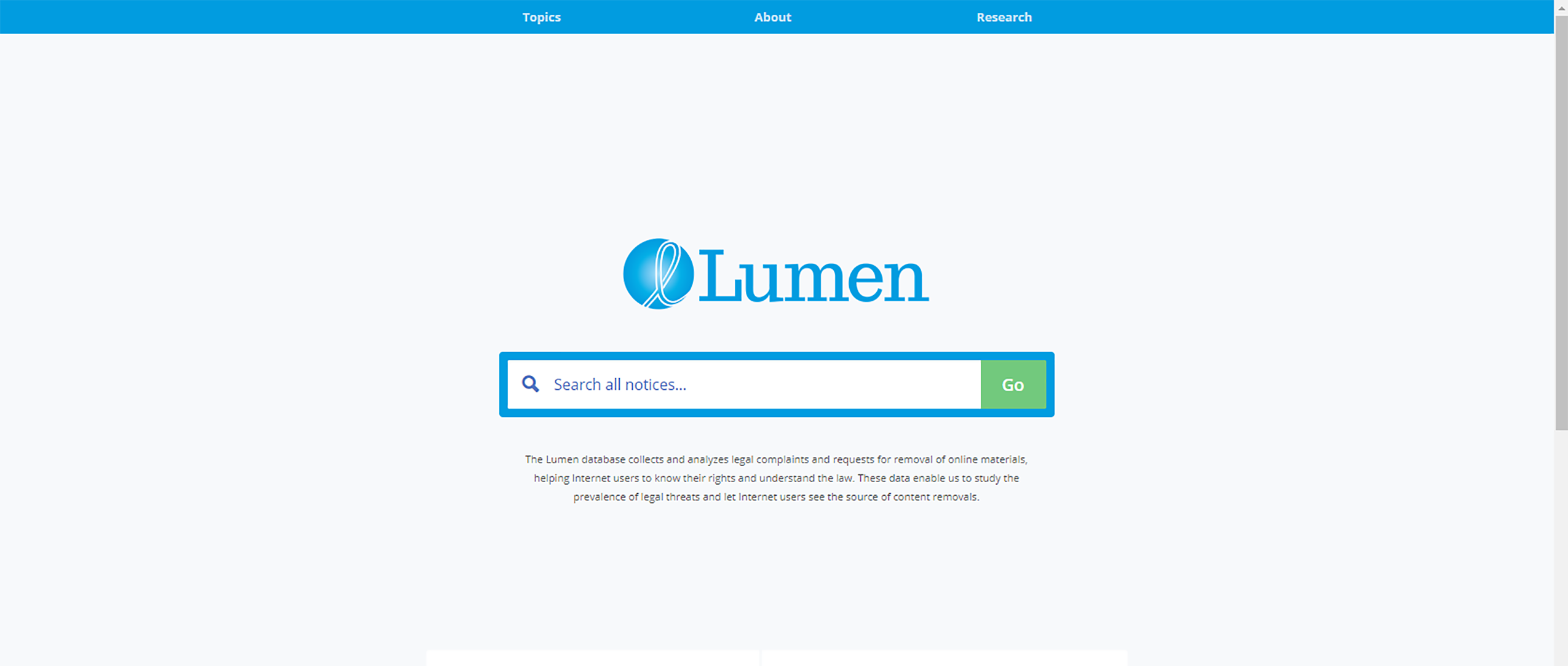Every day, companies like Google remove links to online content in response to court orders, influencing the Internet search results we see. But what happens if bad actors deliberately falsify and submit court documents requesting the removal of content? Research using the Berkman Klein Center for Internet & Society’s Lumen database shows the problem is larger than previously understood.
In the summer of 2016, Professor Eugene Volokh at the University of California, Los Angeles, learned of a few such falsified requests and, seeking to delve deeper into the scope and depth of that fraud, connected with the Lumen project. Through Lumen — an online database of takedown requests related to online content, containing approximately eleven million notices referencing over four billion URLs — Volokh was able to access thousands of relevant court orders that had been submitted to Google and other Internet search companies.
“At its core, Lumen is about transparency. It collects takedown notices that affect what users see on search engines and online generally, notices that would likely otherwise go unseen and unremarked. Lumen is unique because it aggregates takedown notices from multiple sources in one place, allowing researchers to more easily identify trends and patterns,” says Adam Holland, Lumen’s project manager. “When Professor Volokh contacted us to work with Lumen data, we were excited to see how his research would unfold and what he would uncover, but we had no idea the extent of this phenomenon would be so vast.”
Volokh found that over a four-year period, close to 200 out of 700 court orders submitted to Google were what he characterizes as “either obviously forged or fraudulent or at least highly suspicious cases,” including at least 80 outright forgeries. It is possible, Volokh says, that this is still only the “tip of the iceberg.”
“From its inception and through its evolution, Lumen has played a foundational role in helping us to understand what’s behind what we see—and don’t see—online,”
Jonathan Zittrain ’95, the Berkman Klein Center’s faculty director, who worked with Wendy Seltzer to get the fledgling project off the ground in 2000.
“Lumen is an invaluable supplement to court records. Without seeing court orders at Lumen, I wouldn’t have known about most of the cases I’m writing about,” Volokh says. “Only armed with the case number from Lumen could I find further records in those cases.”
Problematic court orders ranged from fake notaries to fake defendants to outright Photoshop forgeries, and use of default judgements without notifying the defendant. Volokh will publish his findings and discuss their implications in more detail in several forthcoming law review articles, but the immediate consequences are stark.
If Google and other online service providers can no longer rely on the presumptive validity of court orders, then they will have difficult choices to make, Holland says. Options could include moving away from honoring court order requests generally, investing substantially more resources in verifying the provenance of every court order received, or accepting the reality of a much higher percentage of both false positives and negatives when it comes to removal decisions.
In addition to Volokh’s work on court orders and other fraud-related research, Lumen supports a number of other ongoing research projects around the world. Other researchers include professors at a variety of U.S. universities, as well as Turkish human rights activists, NGOs, the Committee To Protect Journalists, The Wall Street Journal, and other news organizations. Recently, for example, reporters at the New York Times and TIME used Lumen to help illustrate why Twitter removed a video posted by President Donald Trump.
Some researchers do deep dives on a smaller selection of notices from Lumen’s database, while others take a “big data” approach. Currently, researchers are investigating topics such as the economics of copyright takedowns and related business models, takedowns as a form of censorship, regionally specific and politically-motivated removals, among other topics.
Now in its seventeenth year of operation, Lumen has expanded its scope well beyond its initial focus on copyright and now includes removals of all kinds, including court orders and takedowns issued directly by foreign governments, such as Russia’s ROSKOMNADZOR agency.
With support from Arcadia, a charitable fund that supports open access, Lumen launched a project this fall to increase the number of contributors of takedown notices to its database, implement a wide range of updates and improvements to the back-end of the database as well as the website, and delve into its own research on its data, while still facilitating that of outside researchers.
“From its inception and through its evolution, Lumen has played a foundational role in helping us to understand what’s behind what we see — and don’t see — online,” says Jonathan Zittrain ’95, the Berkman Klein Center’s faculty director, who worked with Wendy Seltzer to get the fledgling project off the ground in 2000. “Lumen is a modest example, in the category of such vital and world-changing efforts as the Internet Archive and the Web itself, of seeing an idea through not because one was formally chartered to do it, but because humanity will be better informed if it’s done.”
